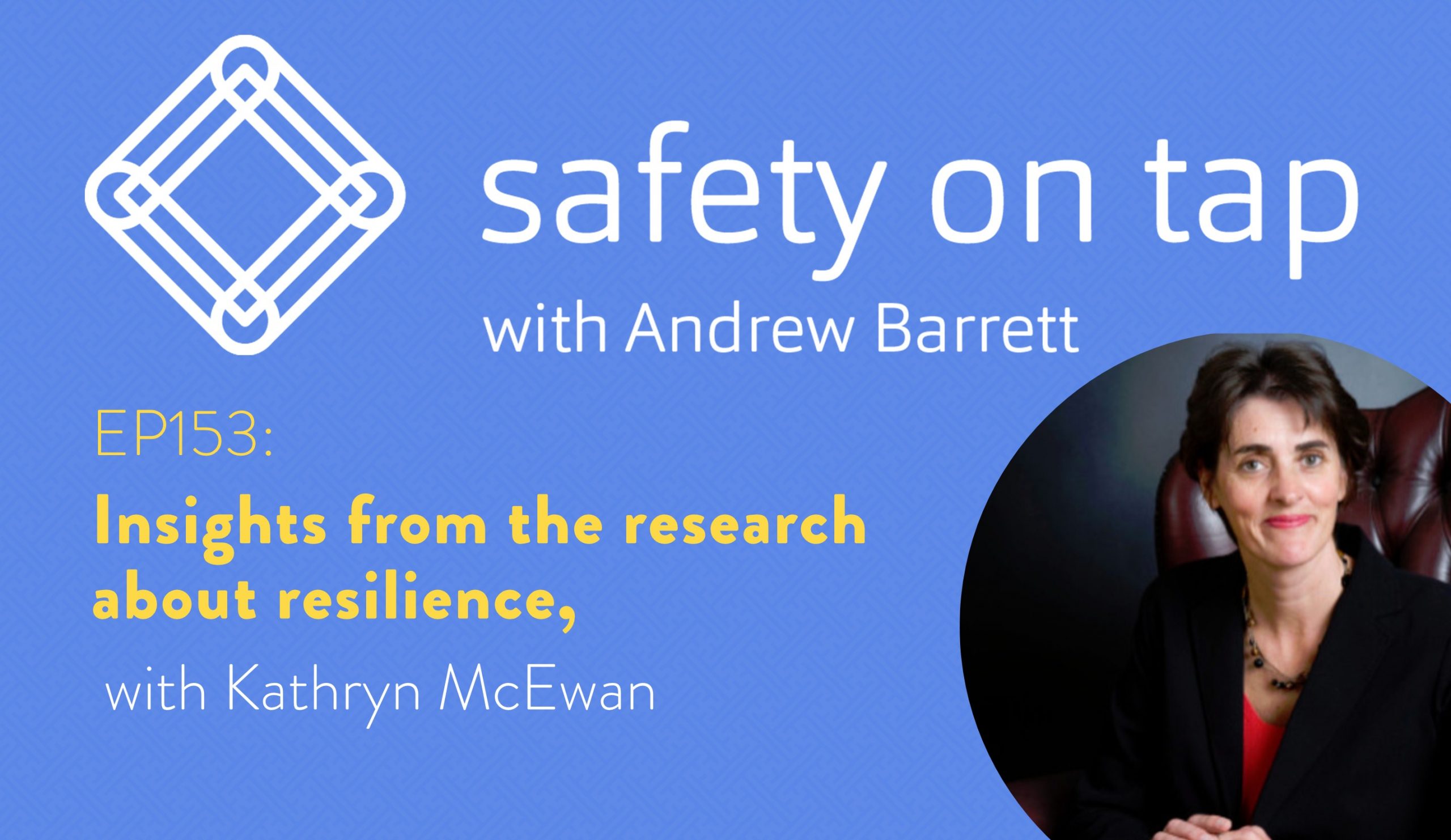Have you ever played bullshit bingo? It’s when you have a bingo card, filled with the overused phrases in your organisation or industry. Things like ‘the journey’, or ‘innovation’, or ‘agile’, or ‘VUCA’. Seems like resilience could be added to the list. Which unfairly smears what is a pretty robust, relevant, and actionable concept. Let’s dig through the BS to the good stuff today.
Hey, it’s Andrew, and this is Safety on Tap.
Since you’re listening in, you must be a leader wanting to grow yourself and drastically improve health and safety along the way. Welcome to you, you’re in the right place. If this is your first time listening in, thanks for joining us and well done for trying something different to improve! And of course welcome back to all of you wonderful regular listeners.
Kathryn McEwan is an organisational psychologist, executive coach and mediator with more than 30 years consulting experience across all industry sectors. Her contribution to the profession has been recognised through the award of ‘Fellow’ by the Australian Psychological Society and the College of Organisational Psychologists. She has a special interest in workplace resilience and has authored three books on resilience at work as well as led development of the R@W Toolkit. She lectures, supervises students, is a Board member and more. And today is cutting through the BS about resilience.
Here’s Kathryn:
It’s a lot to take in, right?
I want to take this time to say, I hope you are doing ok. I don’t share pithy platitudes in these podcasts,
A) because human connection and care is an intimate thing, not me broadcasting a message to thousands of you,
- Because it won’t make sense in one or 3 or 10 years time when someone is listening to this, and
- Because I’m not the best person to be checking in with you, it’s someone in your house, family, team or church.
Talking about resilience, especially individual and team resilience, both of these have been a challenge for me during the early months of covid. I had an awesome conversation today with a wonderful colleague of mine, sensing how I was going and reaching out for an RUOK conversation. It was a lovely, two way exchange of experiences, reflections, strength and support. I hope you are at either end of that kind of conversation regularly. If you are not, I encourage you to be, whether you are checking in with someone, or reaching out to seek the connection and care of someone else. Because the world needs you here – happy, healthy and making a drastic difference to health and safety.
Kathryn mentioned they have a heap of resources over at www.resilience.tv
Here’s my three takeaways from that chat with Kathryn McEwan:
Takeaway #1: Even the academics don’t agree on the definition of resilience. Where does that leave us practitioners? The takeaway here for me, was in how Kathryn focussed us on what change are we seeking to make. Pick one lens for looking at the current state, say team resilience. Understand where it is now, work out what you want to change, work on that change, and evaluate how you went. As for the lens you pick – you should be able to articulate why that’s what you chose, and why it’s better than the next thing (hint, published research helps your argument).
Takeaway #2: Resilience is a team sport. So true. But so is safety, and performance, and innovation, and care. I read in between the lines on this one, if you want to really make an impact, focussing at the individual level alone won’t work. Teams in modern workplaces are almost entirely how work gets done. Usually, when we think of teams, we think of a leader, and individual team members, right? Well, Kathryn explained that team resilience is different from both individual resilience and leadership. The frame of reference matters. How do you understand and influence what’s going on at the team level?
Takeaway #3: Resilience is a verb – a doing word. This is an awesome insight. It is an dynamic state, an adaptive capacity of individuals and teams to use a range of tools and skills and behaviours to continually become, rather than simply be, resilient. Kathryn described this as a scaffold – made of many components, which you can swap in and out, and change configuration. This highlights the fundamental challenge for leaders and health and safety professionals – it is never done, never finished, always changing, and you should be too.
Grab my handwritten reflection notes, a template for your own reflections, and the transcript of this episode all for free over at safetyintap.com/ep153
Thanks so much for listening. Until next time, what’s the one thing you’ll do to take positive, effective or rewarding action, to grow yourself, and drastically improve health and safety along the way? Seeya!
Here’s your FREE reflection worksheet from this episode.
And here’s your FREE download of the full transcript of this episode.
Feel free to share this with your team/colleagues!


Congrats.
Thanks Washington